Discover MLOps.community
MLOps.community

486 Episodes
Reverse
Simba Khadder is the founder and CEO of Featureform, now at Redis, working on real-time feature orchestration and building a context engine for AI and agents.Context Engineering 2.0, Simba Khadder // MLOps Podcast #352Join the Community: https://go.mlops.community/YTJoinInGet the newsletter: https://go.mlops.community/YTNewsletter// AbstractFeature stores aren’t dead — they were just misunderstood. Simba Khadder argues the real bottleneck in agents isn’t models, it’s context, and why Redis is quietly turning into an AI data platform. Context engineering matters more than clever prompt hacks.// BioSimba Khadder leads Redis Context Engine and Redis Featureform, building both the feature and context layer for production AI agents and ML models. He joined Redis via the acquisition of Featureform, where he was Founder & CEO. At Redis, he continues to lead the feature store product as well as spearhead Context Engine to deliver a unified, navigable interface connecting documents, databases, events, and live APIs for real-time, reliable agent workflows. He also loves to surf, go sailing with his wife, and hang out with his dog Chupacabra.// Related LinksWebsite: featureform.comhttps://marketing.redis.io/blog/real-time-structured-data-for-ai-agents-featureform-is-joining-redis/~~~~~~~~ ✌️Connect With Us ✌️ ~~~~~~~Catch all episodes, blogs, newsletters, and more: https://go.mlops.community/TYExploreJoin our Slack community [https://go.mlops.community/slack]Follow us on X/Twitter [@mlopscommunity](https://x.com/mlopscommunity) or [LinkedIn](https://go.mlops.community/linkedin)] Sign up for the next meetup: [https://go.mlops.community/register]MLOps Swag/Merch: [https://shop.mlops.community/]Connect with Demetrios on LinkedIn: /dpbrinkmConnect with Simba on LinkedIn: /simba-k/Timestamps:[00:00] Context engineering explanation[00:25] MLOps and feature stores[03:36] Selling a company experience[06:34] Redis feature store evolution[12:42] Embedding hub[20:42] Human vs agent semantics[26:41] Enrich MCP data flow[29:55] Data understanding and embeddings[35:18] Search and context tools[39:45] MCP explained without hype[45:15] Wrap up
Satish Bhambri is a Sr Data Scientist at Walmart Labs, working on large-scale recommendation systems and conversational AI, including RAG-powered GroceryBot agents, vector-search personalization, and transformer-based ad relevance models.Join the Community: https://go.mlops.community/YTJoinInGet the newsletter: https://go.mlops.community/YTNewsletter// AbstractThe MLOps Community Podcast features Satish Bhambri, Senior Data Scientist with the Personalization and Ranking team at Walmart Labs and one of the emerging leaders in applied AI, in its newest episode. Satish has quietly built one of the most diverse and impactful AI portfolios in his field, spanning quantum computing, deep learning, astrophysics, computer vision, NLP, fraud detection, and enterprise-scale recommendation systems. Bhambri's nearly a decade of research across deep learning, astrophysics, quantum computing, NLP, and computer vision culminated in over 10 peer-reviewed publications released in 2025 through IEEE and Springer, and his early papers are indexed by NASA ADS and Harvard SAO, marking the start of his long-term research arc. He also holds a patent for an AI-powered smart grid optimization framework that integrates deep learning, real-time IoT sensing, and adaptive control algorithms to improve grid stability and efficiency, a demonstration of his original, high-impact contributions to intelligent infrastructure. Bhambri leads personalization and ranking initiatives at Walmart Labs, where his AI systems serve more than (5% of the world’s population) 531 million users every month, roughly based on traffic data. His work with Transformers, Vision-Language Models, RAG and agentic-RAG systems, and GPU-accelerated pipelines has driven significant improvements in scale and performance, including increases in ad engagement, faster compute by and improved recommendation diversity.Satish is a Distinguished Fellow & Assessor at the Soft Computing Research Society (SCRS), a reviewer for IEEE and Springer, and has served as a judge and program evaluator for several elite platforms. He was invited to the NeurIPS Program Judge Committee, the most prestigious AI conference in the world, and to evaluate innovations for DeepInvent AI, where he reviews high-impact research and commercialization efforts. He has also judged Y Combinator Startup Hackathons, evaluating pitches for an accelerator that produced companies like Airbnb, Stripe, Coinbase, Instacart, and Reddit.Before Walmart, Satish built supply-chain intelligence systems at BlueYonder that reduced ETA errors and saved retailers millions while also bringing containers to the production pipeline. Earlier, at ASU’s School of Earth & Space Exploration, he collaborated with astrophysicists on galaxy emission simulations, radio burst detection, and dark matter modeling, including work alongside Dr. Lawrence Krauss, Dr. Karen Olsen, and Dr. Adam Beardsley.On the podcast, Bhambri discusses the evolution of deep learning architectures from RNNs and CNNs to transformers and agentic RAG systems, the design of production-grade AI architectures with examples, and his long-term vision for intelligent systems that bridge research and real-world impact. and the engineering principles behind building production-grade AI at a global scale.// Related LinksPapers: https://scholar.google.com/citations?user=2cpV5GUAAAAJ&hl=enPatent: https://search.ipindia.gov.in/DesignApplicationStatus ~~~~~~~~ ✌️Connect With Us ✌️ ~~~~~~~Catch all episodes, blogs, newsletters, and more: https://go.mlops.community/TYExploreJoin our Slack community [https://go.mlops.community/slack]Follow us on X/Twitter [@mlopscommunity](https://x.com/mlopscommunity) or [LinkedIn](https://go.mlops.community/linkedin)] Sign up for the next meetup: [https://go.mlops.community/register]MLOps Swag/Merch: [https://shop.mlops.community/]Connect with Demetrios on LinkedIn: /dpbrinkm
Zack Reneau-Wedeen is the Head of Product at Sierra, leading the development of enterprise-ready AI agents — from Agent Studio 2.0 to the Agent Data Platform — with a focus on richer workflows, persistent memory, and high-quality voice interactions.How Sierra Does Context Engineering, Zack Reneau-Wedeen // MLOps Podcast #350Join the Community: https://go.mlops.community/YTJoinInGet the newsletter: https://go.mlops.community/YTNewsletter// AbstractSierra’s Zack Reneau-Wedeen claims we’re building AI all wrong and that “context engineering,” not bigger models, is where the real breakthroughs will come from. In this episode, he and Demetrios Brinkmann unpack why AI behaves more like a moody coworker than traditional software, why testing it with real-world chaos (noise, accents, abuse, even bad mics) matters, and how Sierra’s simulations and model “constellations” aim to fix the industry’s reliability problems. They even argue that decision trees are dead, replaced by goals, guardrails, and speculative execution tricks that make voice AI actually usable. Plus: how Sierra trains grads to become product-engineering hybrids, and why obsessing over customers might be the only way AI agents stop disappointing everyone.// Related LinksWebsite: https://www.zackrw.com/~~~~~~~~ ✌️Connect With Us ✌️ ~~~~~~~Catch all episodes, blogs, newsletters, and more: https://go.mlops.community/TYExploreJoin our Slack community [https://go.mlops.community/slack]Follow us on X/Twitter [@mlopscommunity](https://x.com/mlopscommunity) or [LinkedIn](https://go.mlops.community/linkedin)] Sign up for the next meetup: [https://go.mlops.community/register]MLOps Swag/Merch: [https://shop.mlops.community/]Connect with Demetrios on LinkedIn: /dpbrinkmConnect with Zack on LinkedIn: /zackrw/Timestamps:[00:00] Electron cloud vs energy levels[03:47] Simulation vs red teaming[06:51] Access control in models[10:12] Voice vs text simulations[13:12] Speaker-adaptive turn-taking[18:26] Accents and model behavior[23:52] Outcome-based pricing risks[31:40] AI cross-pollination strategies[41:26] Ensemble of models explanation[46:47] Real-time agents vs decision trees[50:15] Code and no-code mix[54:04] Goals and guardrails explained[56:23] Wrap up[57:31] APX program!
Spencer Reagan leads R&D at Airia, working on secure AI-agent orchestration, data governance systems, and real-time signal fusion technologies for regulated and defense environments.Overcoming Challenges in AI Agent Deployment: The Sweet Spot for Governance and Security // MLOps Podcast #349 with Spencer Reagan, R&D at Airia.Join the Community: https://go.mlops.community/YTJoinInGet the newsletter: https://go.mlops.community/YTNewsletterShoutout to Airia for powering this MLOps Podcast episode.// AbstractSpencer Reagan thinks it might be, and he’s not shy about saying so. In this episode, he and Demetrios Brinkmann get real about the messy, over-engineered state of agent systems, why LLMs still struggle in the wild, and how enterprises keep tripping over their own data chaos. They unpack red-teaming, security headaches, and the uncomfortable truth that most “AI platforms” still don’t scale. If you want a sharp, no-fluff take on where agents are actually headed, this one’s worth a listen.// BioPassionate about technology, software, and building products that improve people's lives.// Related LinksWebsite: https://airia.com/Machine Learning, AI Agents, and Autonomy // Egor Kraev // MLOps Podcast #282 - https://youtu.be/zte3QDbQSekRe-Platforming Your Tech Stack // Michelle Marie Conway & Andrew Baker // MLOps Podcast #281 - https://youtu.be/1ouSuBETkdA~~~~~~~~ ✌️Connect With Us ✌️ ~~~~~~~Catch all episodes, blogs, newsletters, and more: https://go.mlops.community/TYExploreJoin our Slack community [https://go.mlops.community/slack]Follow us on X/Twitter [@mlopscommunity](https://x.com/mlopscommunity) or [LinkedIn](https://go.mlops.community/linkedin)] Sign up for the next meetup: [https://go.mlops.community/register]MLOps Swag/Merch: [https://shop.mlops.community/]Connect with Demetrios on LinkedIn: /dpbrinkmConnect with Spencer on LinkedIn: /spencerreagan/Timestamps:[00:00] AI industry future[00:55] Use cases in software[05:44] LLMs for data normalization[11:02] ROI and overengineering[15:58] Street width history[20:58] High ROI examples[25:16] AI building challenges[33:37] Budget control challenges[39:30] Airia Orchestration platform[46:25] Agent evaluation breakdown[53:48] Wrap up
Thanks to Prosus Group for collaborating on the Agents in Production Virtual Conference 2025.Abstract //The discussion centers on highly technical yet practical themes, such as the use of advanced post-training techniques like Direct Preference Optimization (DPO) and Parameter-Efficient Fine-Tuning (PEFT) to ensure LLMs maintain stability while specializing for e-commerce domains. We compare the implementation challenges of Computer-Using Agents in automating legacy enterprise systems versus the stability issues faced by conversational agents when inputs become unpredictable in production. We will analyze the role of cloud infrastructure in supporting the continuous, iterative training loops required by Reinforcement Learning-based agents for e-commerce!Bio // Paul van der Boor (Panel Host) //Paul van der Boor is a Senior Director of Data Science at Prosus and a member of its internal AI group.Arushi Jain (Panelist) // Arushi is a Senior Applied Scientist at Microsoft, working on LLM post-training for Computer-Using Agent (CUA) through Reinforcement Learning. She previously completed Microsoft’s competitive 2-year AI Rotational Program (MAIDAP), building and shipping AI-powered features across four product teams.She holds a Master’s in Machine Learning from the University of Michigan, Ann Arbor, and a Dual Degree in Economics from IIT Kanpur. At Michigan, she led the NLG efforts for the Alexa Prize Team, securing a $250K research grant to develop a personalized, active-listening socialbot. Her research spans collaborations with Rutgers School of Information, Virginia Tech’s Economics Department, and UCLA’s Center for Digital Behavior.Beyond her technical work, Arushi is a passionate advocate for gender equity in AI. She leads the Women in Data Science (WiDS) Cambridge community, scaling participation in her ML workshops from 25 women in 2020 to 100+ in 2025—empowering women and non-binary technologists through education and mentorship.Swati Bhatia //Passionate about building and investing in cutting-edge technology to drive positive impact.Currently shaping the future of AI/ML at Google Cloud.10+ years of global experience across the U.S, EMEA, and India in product, strategy & venture capital (Google, Uber, BCG, Morpheus Ventures).Audi Liu //I’m passionate about making AI more useful and safe.Why? Because AI will be ubiquitous in every workflow, powering our lives just like how electricity revolutionized our society - It’s pivotal we get it right.At Inworld AI, we believe all future software will be powered by voice. As a Sr Product Manager at Inworld, I'm focused on building a real-time voice API that empowers developers to create engaging, human-like experiences. Inworld offers state-of-the-art voice AI at a radically accessible price - No. 1 on Hugging Face and Artificial Analysis, instant voice cloning, rich multilingual support, real-time streaming, and emotion plus non-verbal control, all for just $5 per million characters.Isabella Piratininga //Experienced Product Leader with over 10 years in the tech industry, shaping impactful solutions across micro-mobility, e-commerce, and leading organizations in the new economy, such as OLX, iFood, and now Nubank. I began my journey as a Product Owner during the early days of modern product management, contributing to pivotal moments like scaling startups, mergers of major tech companies, and driving innovation in digital banking.My passion lies in solving complex challenges through user-centered product strategies. I believe in creating products that serve as a bridge between user needs and business goals, fostering value and driving growth. At Nubank, I focus on redefining financial experiences and empowering users with accessible and innovative solutions.Check out all the talks from the conference here: https://go.mlops.community/carzleGet some "I hallucinate more than ChatGPT" t-shirts here: https://go.mlops.community/NL_RY25_Merch
Ricky Doar is the VP of Solutions at Cursor, where he leads forward-deployed engineers. A seasoned product and technical leader with over a decade of experience in developer tools and data platforms, Ricky previously served as VP of Field Engineering at Vercel, where he led global technical solutions for the company's next-generation frontend platform.Prior to Vercel, Ricky held multiple leadership roles at Segment (acquired by Twilio), including Director of Product Management for Twilio Engage, Group Product Manager for Personas, and RVP of Solutions Engineering for the West and APAC regions. He also worked as a Product Engineer and Senior Sales Engineer at Mixpanel, bringing deep technical expertise to customer-facing roles.Thanks to Prosus Group for collaborating on the Agents in Production Virtual Conference 2025.In this session, Ricky Doar, VP of Solutions at Cursor, shares actionable insights from leading large-scale AI developer tool implementations at the world’s top enterprises. Drawing on field experience with organizations at the forefront of transformation, Ricky highlights key best practices, observed power-user patterns, and deployment strategies that maximize value and ensure smooth rollout. Learn what distinguishes high-performing teams, how tailored onboarding accelerates adoption, and which support resources matter most for driving enterprise-wide success.A Prosus | MLOps Community ProductionCheck out all the talks from the conference here: https://go.mlops.community/carzleGet some "I hallucinate more than ChatGPT" t-shirts here: https://go.mlops.community/NL_RY25_Merch
Dr. Jure Leskovec is the Chief Scientist at Kumo.AI and a Stanford professor, working on relational foundation models and graph-transformer systems that bring enterprise databases into the foundation-model era.Relational Foundation Models: Unlocking the Next Frontier of Enterprise AI // MLOps Podcast #348 with Jure Leskovec, Professor and Chief Scientist, Stanford University and Kumo.AI.Join the Community: https://go.mlops.community/YTJoinInGet the newsletter: https://go.mlops.community/YTNewsletter// AbstractToday’s foundation models excel at text and images—but they miss the relationships that define how the world works. In every enterprise, value emerges from connections: customers to products, suppliers to shipments, molecules to targets. This talk introduces Relational Foundation Models (RFMs)—a new class of models that reason over interactions, not just data points. Drawing on advances in graph neural networks and large-scale ML systems, I’ll show how RFMs capture structure, enable richer reasoning, and deliver measurable business impact. Audience will learn where relational modeling drives the biggest wins, how to build the data backbone for it, and how to operationalize these models responsibly and at scale.// BioJure Leskovec is the co-founder of Kumo.AI, an enterprise AI company pioneering AI foundation models that can reason over structured business data. He is also a Professor of Computer Science at Stanford University and a leading researcher in artificial intelligence, best known for pioneering Graph Neural Networks and creating PyG, the most widely used graph learning toolkit. Previously, Jure served as Chief Scientist at Pinterest and as an investigator at the Chan Zuckerberg BioHub. His research has been widely adopted in industry and government, powering applications at companies such as Meta, Uber, YouTube, Amazon, and more. He has received top awards in AI and data science, including the ACM KDD Innovation Award.// Related LinksWebsite: https://cs.stanford.edu/people/jure/https://www.youtube.com/results?search_query=jure+leskovecPlease watch Jure's keynote:https://www.youtube.com/watch?v=Rcfhh-V7x2U~~~~~~~~ ✌️Connect With Us ✌️ ~~~~~~~Catch all episodes, blogs, newsletters, and more: https://go.mlops.community/TYExploreJoin our Slack community [https://go.mlops.community/slack]Follow us on X/Twitter [@mlopscommunity](https://x.com/mlopscommunity) or [LinkedIn](https://go.mlops.community/linkedin)] Sign up for the next meetup: [https://go.mlops.community/register]MLOps Swag/Merch: [https://shop.mlops.community/]Connect with Demetrios on LinkedIn: /dpbrinkmConnect with Jure on LinkedIn: /leskovecTimestamps:[00:00] Structured data value[00:26] Breakdown of ML Claims[05:04] LLMs vs recommender systems[10:09] Building a relational model[15:47] Feature engineering impact[20:42] Knowledge graph inference[26:45] Advertising models scale[32:57] Feature stores evolution[38:00] Training model compute needs[42:34] Predictive AI for agents[45:32] Leveraging faster predictive models[48:00] Wrap up
Jeff Huber is the CEO of Chroma, working on context engineering and building reliable retrieval infrastructure for AI systems. Context Engineering, Context Rot, & Agentic Search with the CEO of Chroma, Jeff Huber // MLOps Podcast #348.Join the Community: https://go.mlops.community/YTJoinInGet the newsletter: https://go.mlops.community/YTNewsletter// AbstractJeff Huber drops some hard truths about “context rot” — the slow decay of AI memory that’s quietly breaking your favorite models. From retrieval chaos to the hidden limits of context windows, he and Demetrios Brinkmann unpack why most AI systems forget what matters and how Chroma is rethinking the entire retrieval stack. It’s a bold look at whether smarter AI means cleaner context — or just better ways to hide the mess.// BioJeff Huber is the CEO and cofounder of Chroma. Chroma has raised $20M from top investors in Silicon Valley and builds modern search infrastructure for AI.// Related LinksWebsite: https://www.trychroma.com/~~~~~~~~ ✌️Connect With Us ✌️ ~~~~~~~Catch all episodes, blogs, newsletters, and more: https://go.mlops.community/TYExploreJoin our Slack community [https://go.mlops.community/slack]Follow us on X/Twitter [@mlopscommunity](https://x.com/mlopscommunity) or [LinkedIn](https://go.mlops.community/linkedin)] Sign up for the next meetup: [https://go.mlops.community/register]MLOps Swag/Merch: [https://shop.mlops.community/]Connect with Demetrios on LinkedIn: /dpbrinkmConnect with Jeff on LinkedIn: /jeffchuber/Timestamps:[00:00] AI intelligence context clarity[00:37] Context rot explanation[03:02] Benchmarking context windows[05:09] Breaking down search eras[10:50] Agent task memory issues[17:21] Semantic search limitations[22:54] Context hygiene in AI[30:15] Chroma on-device functionality[38:23] Vision for precision systems[43:07] ML model deployment challenges[44:17] Wrap up
Brooke Hopkins is the CEO of Coval, a company making voice agents more reliable. Reliable Voice Agents // MLOps Podcast #347 with Brooke Hopkins, Founder of Coval.Join the Community: https://go.mlops.community/YTJoinInGet the newsletter: https://go.mlops.community/YTNewsletter// AbstractVoice AI is finally growing up—but not without drama. Brooke Hopkins joins Demetrios Brinkmann to unpack why most “smart” voice systems still feel dumb, what it actually takes to make them reliable, and how startups are quietly outpacing big tech in building the next generation of voice agents.// BioBrooke Hopkins is the founder of Coval, a simulation and evaluation platform for AI agents. She previously led the evaluation job infrastructure at Waymo. There, her team was responsible for the developer tools for launching and running simulations, and she engineered many of the core simulation systems from the ground up.// Related LinksWebsite: https://www.coval.dev/~~~~~~~~ ✌️Connect With Us ✌️ ~~~~~~~Catch all episodes, blogs, newsletters, and more: https://go.mlops.community/TYExploreJoin our Slack community [https://go.mlops.community/slack]Follow us on X/Twitter [@mlopscommunity](https://x.com/mlopscommunity) or [LinkedIn](https://go.mlops.community/linkedin)] Sign up for the next meetup: [https://go.mlops.community/register]MLOps Swag/Merch: [https://shop.mlops.community/]Connect with Demetrios on LinkedIn: /dpbrinkmConnect with Brooke on LinkedIn: /bnhop/Timestamps:[00:00] Workshop feedback[02:21] IVR frustration and transition[05:06] Voice use cases in business[11:00] Voice AI reliability challenge[18:46] Voice AI reliability issues[24:35] Injecting context[27:16] Conversation flow analysis[34:52] AI overgeneralization and confidence[37:41] Wrap up
Rani Radhakrishnan is a Principal at PwC US, leading work on AI-managed services, autonomous agents, and data-driven transformation for enterprises.The Future of AI Operations: Insights from PwC AI Managed Services // MLOps Podcast #345 with Rani Radhakrishnan, Principal, Technology Managed Services - AI, Data Analytics and Insights at PwC US.Huge thanks to PwC for supporting this episode!Join the Community: https://go.mlops.community/YTJoinInGet the newsletter: https://go.mlops.community/YTNewsletter// AbstractIn today’s data-driven IT landscape, managing ML lifecycles and operations is converging.On this podcast, we’ll explore how end-to-end ML lifecycle practices extend to proactive, automation-driven IT operations.We'll discuss key MLOps concepts—CI/CD pipelines, feature stores, model monitoring—and how they power anomaly detection, event correlation, and automated remediation. // BioRani Radhakrishnan, a Principal at PwC, currently leads the AI Managed Services and Data & Insight teams in PwC US Technology Managed Services.Rani excels at transforming data into strategic insights, driving informed decision-making, and delivering innovative solutions. Her leadership is marked by a deep understanding of emerging technologies and a commitment to leveraging them for business growth.Rani’s ability to align and deliver AI solutions with organizational outcomes has established her as a thought leader in the industry.Her passion for applying technology to solve tough business challenges and dedication to excellence continue to inspire her teams and help drive success for her clients in the rapidly evolving AI landscape. // Related LinksWebsite: https://www.pwc.com/us/managedserviceshttps://www.pwc.com/us/en/tech-effect.html~~~~~~~~ ✌️Connect With Us ✌️ ~~~~~~~Catch all episodes, blogs, newsletters, and more: https://go.mlops.community/TYExploreJoin our Slack community [https://go.mlops.community/slack]Follow us on X/Twitter [@mlopscommunity](https://x.com/mlopscommunity) or [LinkedIn](https://go.mlops.community/linkedin)] Sign up for the next meetup: [https://go.mlops.community/register]MLOps Swag/Merch: [https://shop.mlops.community/]Connect with Demetrios on LinkedIn: /dpbrinkmConnect with Rani on LinkedIn: /rani-radhakrishnan-163615Timestamps:[00:00] Getting to Know Rani[01:54] Managed services[03:50] AI usage reflection[06:21] IT operations and MLOps[11:23] MLOps and agent deployment[14:35] Startup challenges in managed services[16:50] Lift vs practicality in ML[23:45] Scaling in production[27:13] Data labeling effectiveness[29:40] Sustainability considerations[37:00] Product engineer roles[40:21] Wrap up
Andy Pernsteiner is the Field CTO at VAST Data, working on large-scale AI infrastructure, serverless compute near data, and the rollout of VAST’s AI Operating System.The GPU Uptime Battle // MLOps Podcast #346 with Andy Pernsteiner, Field CTO of VAST Data.Huge thanks to VAST Data for supporting this episode!Join the Community: https://go.mlops.community/YTJoinInGet the newsletter: https://go.mlops.community/YTNewsletter// AbstractMost AI projects don’t fail because of bad models; they fail because of bad data plumbing. Andy Pernsteiner joins the podcast to talk about what it actually takes to build production-grade AI systems that aren’t held together by brittle ETL scripts and data copies. He unpacks why unifying data - rather than moving it - is key to real-time, secure inference, and how event-driven, Kubernetes-native pipelines are reshaping the way developers build AI applications. It’s a conversation about cutting out the complexity, keeping data live, and building systems smart enough to keep up with your models. // BioAndy is the Field Chief Technology Officer at VAST, helping customers build, deploy, and scale some of the world’s largest and most demanding computing environments.Andy has spent the past 15 years focused on supporting and building large-scale, high-performance data platform solutions. From humble beginnings as an escalations engineer at pre-IPO Isilon, to leading a team of technical Ninjas at MapR, he’s consistently been in the frontlines solving some of the toughest challenges that customers face when implementing Big Data Analytics and next-generation AI solutions.// Related LinksWebsite: www.vastdata.comhttps://www.youtube.com/watch?v=HYIEgFyHaxkhttps://www.youtube.com/watch?v=RyDHIMniLro The Mom Test by Rob Fitzpatrick: https://www.momtestbook.com/~~~~~~~~ ✌️Connect With Us ✌️ ~~~~~~~Catch all episodes, blogs, newsletters, and more: https://go.mlops.community/TYExploreJoin our Slack community [https://go.mlops.community/slack]Follow us on X/Twitter [@mlopscommunity](https://x.com/mlopscommunity) or [LinkedIn](https://go.mlops.community/linkedin)] Sign up for the next meetup: [https://go.mlops.community/register]MLOps Swag/Merch: [https://shop.mlops.community/]Connect with Demetrios on LinkedIn: /dpbrinkmConnect with Andy on LinkedIn: /andypernsteinerTimestamps:[00:00] Prototype to production gap[00:21] AI expectations vs reality[03:00] Prototype vs production costs[07:47] Technical debt awareness[10:13] The Mom Test[15:40] Chaos engineering[22:25] Data messiness reflection[26:50] Small data value[30:53] Platform engineer mindset shift[34:26] Gradient description comparison[38:12] Empathy in MLOps[45:48] Empathy in Engineering[51:04] GPU clusters rolling updates[1:03:14] Checkpointing strategy comparison[1:09:44] Predictive vs Generative AI[1:17:51] On Growth, Community, and New Directions[1:24:21] UX of agents[1:32:05] Wrap up
Dr. Jeff Schwartzentruber is a Senior Machine Learning Scientist at eSentire, working on anomaly detection pipelines and the use of large language models to enhance cybersecurity operations.The Evolution of AI in Cyber Security // MLOps Podcast #344 with Jeff Schwartzentruber, Staff Machine Learning Scientist at eSentire.Join the Community: https://go.mlops.community/YTJoinInGet the newsletter: https://go.mlops.community/YTNewsletter// AbstractModern cyber operations can feel opaque. This talk explains—step by step—what a security operations center (SOC) actually does, how telemetry flows in from networks, endpoints, and cloud apps, and what an investigation can credibly reveal about attacker behavior, exposure, and control gaps. We then trace how AI has shown up in the SOC: from rules and classic machine learning for detection to natural-language tools that summarize alerts and turn questions like “show failed logins from new countries in the last 24 hours” into fast database queries. The core of the talk is our next step: agentic investigations. These GenAI agents plan their work, run queries across tools, cite evidence, and draft analyst-grade findings—with guardrails and a human in the loop. We close with what’s next: risk-aware auto-remediation, verifiable knowledge sources, and a practical checklist for adopting these capabilities safely.// BioDr. Jeff Schwartzentruber holds the position of Sr. Machine Learning Scientist at eSentire – a Canadian cybersecurity company specializing in Managed Detection and Response (MDR). Dr. Schwartzentruber’s primary academic and industry research has been concentrated on solving problems at the intersection of cybersecurity and machine learning (ML). Over his +10-year career, Dr. Schwartzentruber has been involved in applying ML for threat detection and security analytics for several large Canadian financial institutions, public sector organizations (federal), and SME’s. In addition to his private sector work, Dr. Schwartzentruber is also an Adjunct Faculty at Dalhousie University in the Department of Computer Science, a Special Graduate Faculty member with the School of Computer Science at the University of Guelph, and a Sr. Advisor on AI at the Rogers Cyber Secure Catalysts.// Related LinksWebsite: https://www.esentire.com/~~~~~~~~ ✌️Connect With Us ✌️ ~~~~~~~Catch all episodes, blogs, newsletters, and more: https://go.mlops.community/TYExploreJoin our Slack community [https://go.mlops.community/slack]Follow us on X/Twitter [@mlopscommunity](https://x.com/mlopscommunity) or [LinkedIn](https://go.mlops.community/linkedin)] Sign up for the next meetup: [https://go.mlops.community/register]MLOps Swag/Merch: [https://shop.mlops.community/]Connect with Demetrios on LinkedIn: /dpbrinkmConnect with Jeff on LinkedIn: /jeff-schwartzentruber/
Jaipal Singh Goud is the CTO at Prem AI, working on model customization and privacy-preserving compute. This episode was recorded at the Plan B studios in Lugano, Switzerland. For more information, visit https://pow.space/How do fine-tuned models and RAG systems power personalized AI agents that learn, collaborate, and transform enterprise workflows? What kind of technical challenges do we need to first examine before this becomes real?Demetrios Brinkmann - Founder of MLOps Community~~~~~~~~ ✌️Connect With Us ✌️ ~~~~~~~Catch all episodes, blogs, newsletters, and more: https://go.mlops.community/TYExploreJoin our Slack community [https://go.mlops.community/slack]Follow us on X/Twitter [@mlopscommunity](https://x.com/mlopscommunity) or [LinkedIn](https://go.mlops.community/linkedin)] Sign up for the next meetup: [https://go.mlops.community/register]MLOps Swag/Merch: [https://shop.mlops.community/]
The Semantic Layer and AI Agents // MLOps Podcast #343 with David Jayatillake, VP of AI at Cube.dev.Join the Community: https://go.mlops.community/YTJoinInGet the newsletter: https://go.mlops.community/YTNewsletter// AbstractDavid Jayatillake argues that the real battle in data isn’t about AI — it’s about who controls the semantics. In this episode, he calls out how proprietary BI tools quietly lock companies into their ecosystems, making data less open and less useful. David and Demetrios debate whether semantic layers should live in open-source hands and how AI agents might soon replace entire chunks of manual data engineering. From feature stores to LLM-driven analytics, this conversation challenges how we think about ownership, access, and the future of data workflows.// BioExperienced and world-renowned data, technology, and AI leader. Expert in the application of LLMs to the semantic layer.Writes at davidsj.substack.com about data, leadership, architecture, venture capital, and artificial intelligence.Two-time co-founder in the data space. Founded Delphi Labs, which focused on applying LLMs to semantic layers to enable data democratization.Regular data conference, podcast, panel, and webinar speaker. // Related LinksWebsite: davidsj.substack.com~~~~~~~~ ✌️Connect With Us ✌️ ~~~~~~~Catch all episodes, blogs, newsletters, and more: https://go.mlops.community/TYExploreJoin our Slack community [https://go.mlops.community/slack]Follow us on X/Twitter [@mlopscommunity](https://x.com/mlopscommunity) or [LinkedIn](https://go.mlops.community/linkedin)] Sign up for the next meetup: [https://go.mlops.community/register]MLOps Swag/Merch: [https://shop.mlops.community/]Connect with Demetrios on LinkedIn: /dpbrinkmConnect with David on LinkedIn: /david-jayatillake/
Building Claude Code: Origin, Story, Product Iterations, & What's Next // MLOps Podcast #342 with Siddharth Bidasaria, Member of Technical Staff at Anthropic.Join the Community: https://go.mlops.community/YTJoinInGet the newsletter: https://go.mlops.community/YTNewsletter// AbstractDemetrios Brinkmann talks with Siddharth Bidasaria about Anthropic’s Claude code — how it was built, key features like file tools and Spotify control, and the team’s lean, user-focused approach. They explore testing, subagents, and the future of agentic coding, plus how users are pushing its limits.// BioSoftware engineer. Founding team of Claude Code. Ex-Robinhood and Rubrik. // Related LinksBio: https://sidb.io/Sid's Blog: https://sidb.io/posts/ I Let An AI Play Pokémon! - Claude plays Pokémon Creator: https://youtu.be/nRHeGJwVP18How Data Platforms Affect ML & AI // Jake Watson // MLOps Podcast #207: https://youtu.be/xWApMuyct_4The Agent Landscape - Lessons Learned Putting Agents Into Production: https://youtu.be/lRGldru7ohU~~~~~~~~ ✌️Connect With Us ✌️ ~~~~~~~Catch all episodes, blogs, newsletters, and more: https://go.mlops.community/TYExploreJoin our Slack community [https://go.mlops.community/slack]Follow us on X/Twitter [@mlopscommunity](https://x.com/mlopscommunity) or [LinkedIn](https://go.mlops.community/linkedin)] Sign up for the next meetup: [https://go.mlops.community/register]MLOps Swag/Merch: [https://shop.mlops.community/]Connect with Demetrios on LinkedIn: /dpbrinkmConnect with Marco on LinkedIn: /siddharthbidasaria/Timestamps:[00:00] MCP servers usage creativity[00:34] Claude's code origin story[05:17] R&D freedom and tools[09:08] Model potential discovery[12:06] Model adaptation strategies[19:13] Steerability vs pattern alignment[22:09] Features to delete[24:12] Moore's law in LLMs[32:42] Power user surprises[35:56] Sub-agent evolution insights[39:54] Agent communication governance[45:26] At-scale agent coordination[49:56] Wrap up
What if AI could actually remember like humans do?Biswaroop Bhattacharjee joins Demetrios Brinkmann to challenge how we think about memory in AI. From building Cortex—a system inspired by human cognition—to exploring whether AI should forget, this conversation questions the limits of agentic memory and how far we should go in mimicking the mind.Guest speaker: Biswaroop Bhattacharjee - Senior ML Engineer at Prem AIHost :Demetrios Brinkmann - Founder of MLOps Community~~~~~~~~ ✌️Connect With Us ✌️ ~~~~~~~Catch all episodes, blogs, newsletters, and more: https://go.mlops.community/TYExploreJoin our Slack community [https://go.mlops.community/slack]Follow us on X/Twitter [@mlopscommunity](https://x.com/mlopscommunity) or [LinkedIn](https://go.mlops.community/linkedin)] Sign up for the next meetup: [https://go.mlops.community/register]MLOps Swag/Merch: [https://shop.mlops.community/]#podcast #aiinfrastructure #aiagents #memory
LLMs at Scale: Infrastructure That Keeps AI Safe, Smart & Affordable // MLOps Podcast #341 with Marco Palladino, Kong's Co-Founder and CTO.Join the Community: https://go.mlops.community/YTJoinInGet the newsletter: https://go.mlops.community/YTNewsletter// AbstractWhile conversations around AI regulations continue to evolve, the responsibility for AI continues to be with developers. In this episode, Marco Palladino, CTO and co-founder of Kong Inc., explores what it means to build and scale AI responsibly when the rulebook is still being written. He explains that infrastructure should be the frontline defense for enforcing governance, security, and reliability in AI deployments. Marco shares how Kong’s technologies, including AI Gateway and AI Manager, help organizations rein in shadow AI, reduce LLM hallucinations, improve observability, and act as the foundation for agentic workflows.// BioMarco Palladino is an inventor, software developer, and internet entrepreneur. As the CTO and co-founder of Kong, he is Kong’s co-author, responsible for the design and delivery of the company’s products, while also providing technical thought leadership around APIs and microservices within both Kong and the external software community. Prior to Kong, Marco co-founded Mashape in 2010, which became the largest API marketplace and was acquired by RapidAPI in 2017. // Related LinksWebsite: https://konghq.com/ https://www.youtube.com/watch?v=odpPVeQZjHU https://www.thestack.technology/the-big-interview-kong-cto-marco-palladino/ ~~~~~~~~ ✌️Connect With Us ✌️ ~~~~~~~Catch all episodes, blogs, newsletters, and more: https://go.mlops.community/TYExploreJoin our Slack community [https://go.mlops.community/slack]Follow us on X/Twitter [@mlopscommunity](https://x.com/mlopscommunity) or [LinkedIn](https://go.mlops.community/linkedin)] Sign up for the next meetup: [https://go.mlops.community/register]MLOps Swag/Merch: [https://shop.mlops.community/]Connect with Demetrios on LinkedIn: /dpbrinkmConnect with Marco on LinkedIn: /marcopalladino/Timestamps:[00:00] Agent-mediated interactions shift[01:17] Kong connectivity and agents[04:36] Transcript cleanup request[08:11] MCP server use cases[12:37] Agent world possibilities [15:55] Business communication evolution[18:55] System optimization[25:36] AI gateway patterns[31:30] Investment decision making[35:54] Building conviction process[41:34] Polished customer conversation[46:37] AI gateway R&D future[50:52] Wrap up
AI Conversations Powered by Prosus Group Unicorn Mafia won the recent hackathon at Raise Summit and explained to me what they built, including all the tech they used under the hood to make their AI agents work. Winners:Charlie Cheesman - Co-founder at 60x.aiMarissa Liu - Tech Lead, Reporting at WatershedAna Shevchenko - Software Engineer II at SpotifyFergus McKenzie-Wilson - Co-founder at 60x.aiAlex Choi - Founding Engineer at MedfinHost:Demetrios Brinkmann - Founder of MLOps Community~~~~~~~~ ✌️Connect With Us ✌️ ~~~~~~~Catch all episodes, blogs, newsletters, and more: https://go.mlops.community/TYExploreJoin our Slack community [https://go.mlops.community/slack]Follow us on X/Twitter [@mlopscommunity](https://x.com/mlopscommunity) or [LinkedIn](https://go.mlops.community/linkedin)] Sign up for the next meetup: [https://go.mlops.community/register]MLOps Swag/Merch: [https://shop.mlops.community/]
On-Device AI Agents in Production: Privacy, Performance, and Scale // MLOps Podcast #340 with NimbleEdge's Varun Khare, Founder/CEO and Neeraj Poddar, Co-founder & CTO.Join the Community: https://go.mlops.community/YTJoinInGet the newsletter: https://go.mlops.community/YTNewsletter// AbstractAI agents are transitioning from experimental stages to performing real work in production; however, they have largely been limited to backend task automation. A critical frontier in this evolution is the on-device AI agent, enabling sophisticated, AI-native experiences directly on mobile and embedded devices. While cloud-based AI faces challenges like constant connectivity demands, increased latency, privacy risks, and high operational costs, on-device breaks through these trade-offs.We'll delve into the practical side of building and deploying AI agents with “DeliteAI”, an open-source on-device AI agentic framework. We'll explore how lightweight Python runtimes facilitate the seamless orchestration of end-to-end workflows directly on devices, allowing AI/ML teams to define data preprocessing, feature computation, model execution, and post-processing logic independently of frontend code. This architecture empowers agents to adapt to varying tasks and user contexts through an ecosystem of tools natively supported on Android/iOS platforms, handling all the permissions, model lifecycles, and many more.// BioVarun KhareVarun is the Founder and CEO of NimbleEdge, an AI startup pioneering privacy-first, on-device intelligence. With an academic foundation in AI and neuroscience from UC Berkeley, MPI Frankfurt, and IIT Kanpur, Varun brings deep expertise at the intersection of technology and science. Before founding NimbleEdge, Varun led open-source projects at OpenMined, focusing on privacy-aware AI, and published research in computer vision.Neeraj PoddarNeeraj Poddar is the Co-founder and CTO at NimbleEdge. Prior to NimbleEdge, he was the Co-founder of Aspen Mesh, VP of Engineering at Solo.io, and led the Istio open source community. He has worked on various aspects of AI, networking, security, and distributed systems over the span of his career. Neeraj focuses on the application of open source technologies across different industries in terms of scalability and security. When not working on AI, you can find him playing racquetball and gaining back the calories spent playing by trying out new restaurants. // Related LinksWebsite: https://www.nimbleedge.com/https://www.nimbleedge.com/blog/why-ai-is-not-working-for-youhttps://www.nimbleedge.com/blog/state-of-on-device-aihttps://www.youtube.com/watch?v=Qqj_Nl2MihEhttps://www.linkedin.com/events/7343237917982527488/comments/~~~~~~~~ ✌️Connect With Us ✌️ ~~~~~~~Catch all episodes, blogs, newsletters, and more: https://go.mlops.community/TYExploreJoin our Slack community [https://go.mlops.community/slack]Follow us on X/Twitter [@mlopscommunity](https://x.com/mlopscommunity) or [LinkedIn](https://go.mlops.community/linkedin)] Sign up for the next meetup: [https://go.mlops.community/register]MLOps Swag/Merch: [https://shop.mlops.community/]Connect with Demetrios on LinkedIn: /dpbrinkmConnect with Varun on LinkedIn: /vkkhare/Connect with Neeraj on LinkedIn: /nrjpoddar/Timestamps:[00:00] On-device AI skepticism[02:47] Word suggestion for AI[06:40] Optimizing unique challenges[13:39] LLM on-device challenges[20:34] Agent overlord tension[23:56] AI app constraints[29:23] Siri limitations and trust gap[32:01] Voice-driven app privacy[35:49] Platform lock-in vs aggregation[42:26] On-device AI optimizations[45:38] Wrap up
AI Conversations Powered by Prosus Group Your AI agent isn’t failing because it’s dumb—it’s failing because you refuse to test it. Chiara Caratelli cuts through the hype to show why evaluations—not bigger models or fancier prompts—decide whether agents succeed in the real world. If you’re not stress-testing, simulating, and iterating on failures, you’re not building AI—you’re shipping experiments disguised as products.Guest speaker: Chiara Caratelli - Data Scientist @ Prosus GroupHost: Demetrios Brinkmann - Founder of MLOps Community~~~~~~~~ ✌️Connect With Us ✌️ ~~~~~~~Catch all episodes, blogs, newsletters, and more: https://go.mlops.community/TYExploreJoin our Slack community [https://go.mlops.community/slack]Follow us on X/Twitter [@mlopscommunity](https://x.com/mlopscommunity) or [LinkedIn](https://go.mlops.community/linkedin)] Sign up for the next meetup: [https://go.mlops.community/register]MLOps Swag/Merch: [https://shop.mlops.community/]


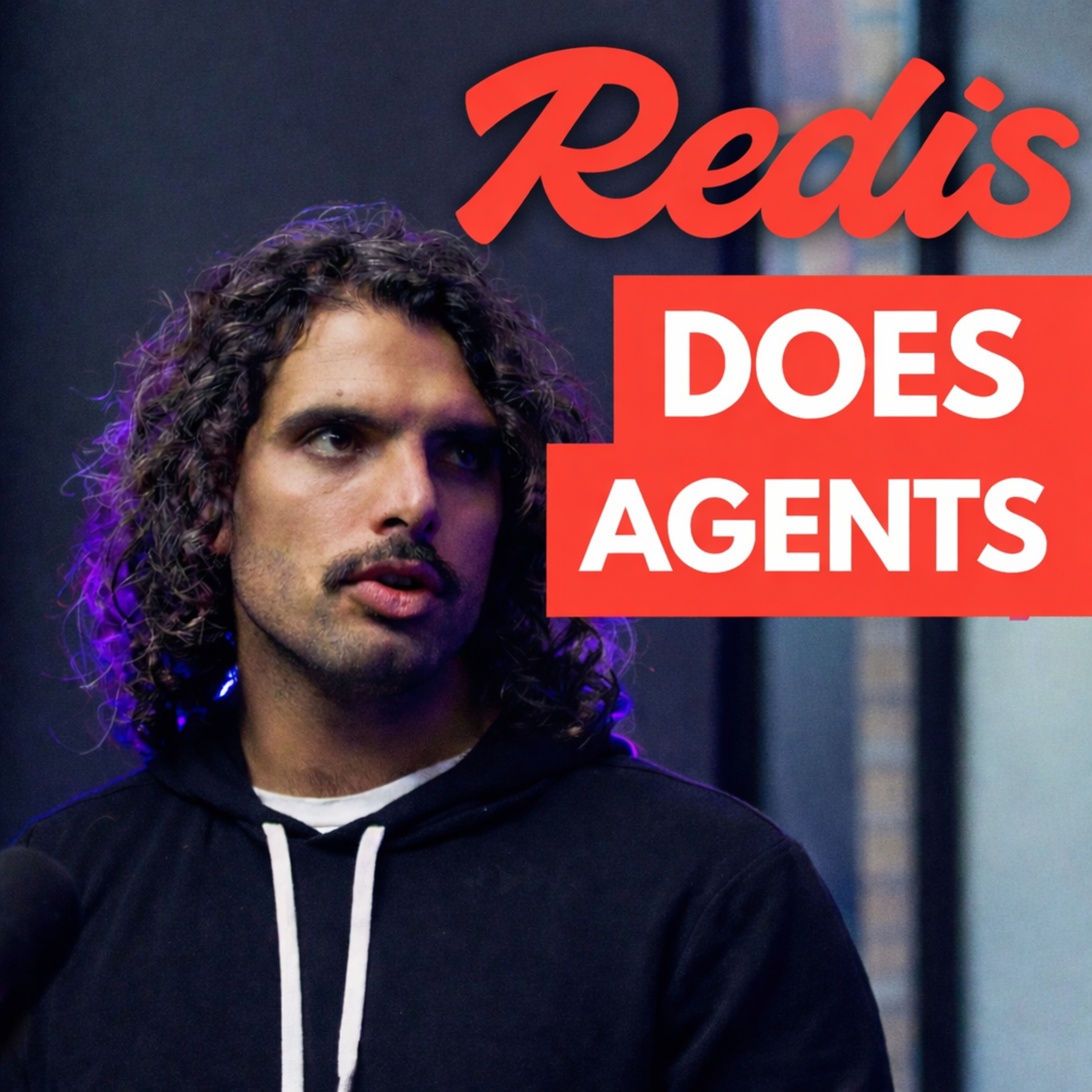
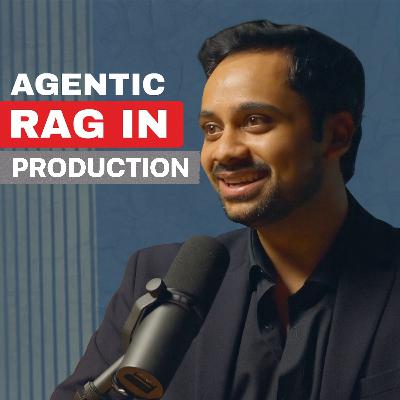
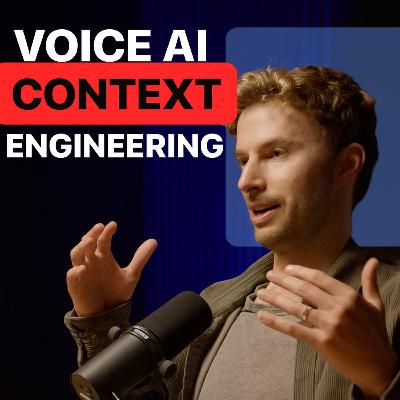
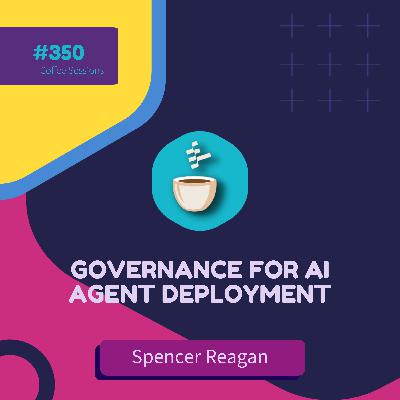
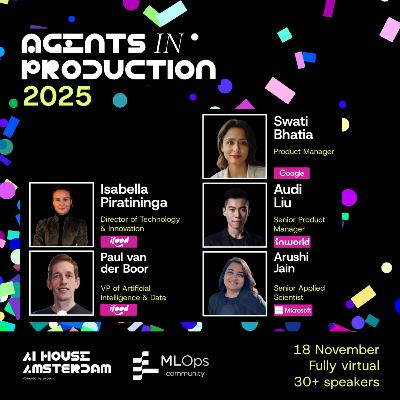
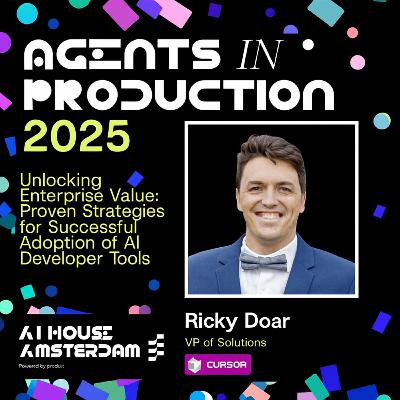
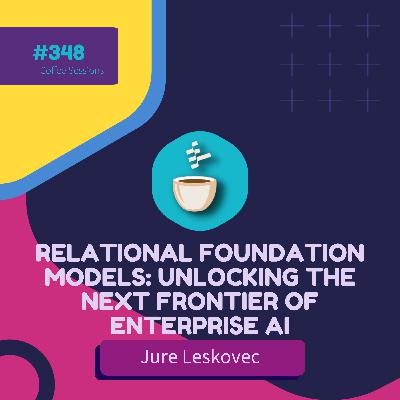



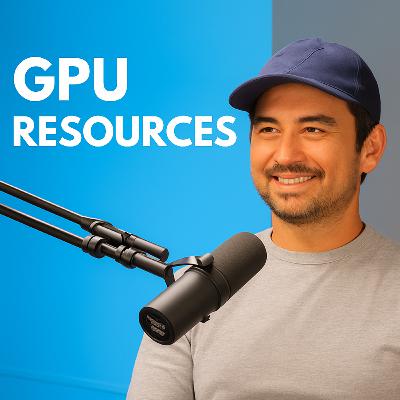
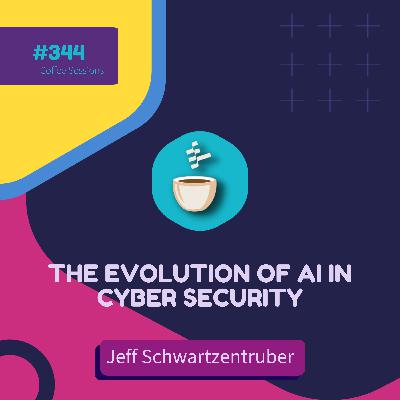

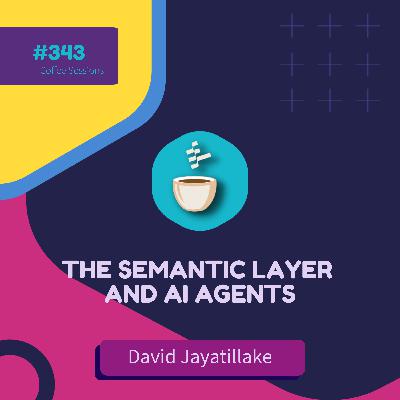
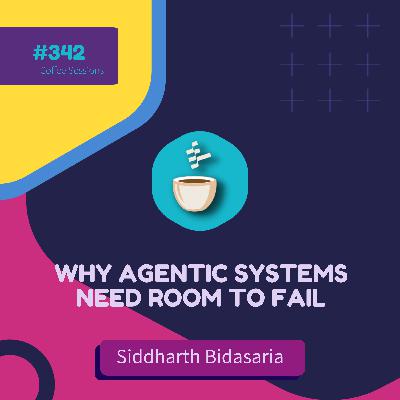

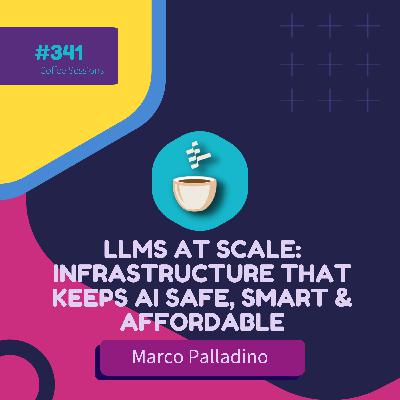
![Best AI Hackathon Project Ever? [Bite Size Episode] Best AI Hackathon Project Ever? [Bite Size Episode]](https://s3.castbox.fm/68/eb/4c/389b375a68d46db6654cdca9b013243274_scaled_v1_400.jpg)
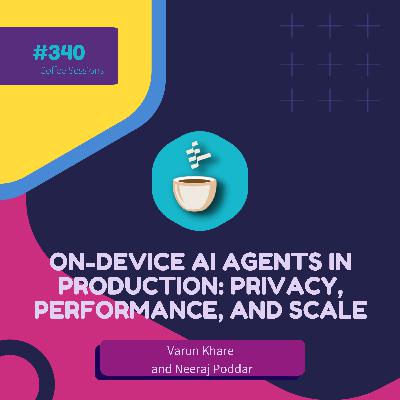




"in Kaggle you normally see a 1-1 ratio of positive to negative examples" huh? has he ever done a Kaggle competition? this statement is totally off